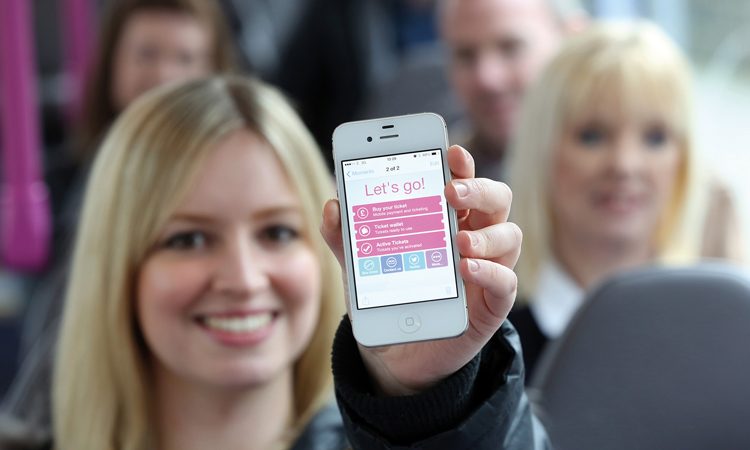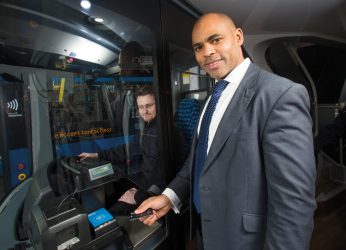mTickets and contactless technology make big impact on First Bus customers
- Like
- Digg
- Del
- Tumblr
- VKontakte
- Buffer
- Love This
- Odnoklassniki
- Meneame
- Blogger
- Amazon
- Yahoo Mail
- Gmail
- AOL
- Newsvine
- HackerNews
- Evernote
- MySpace
- Mail.ru
- Viadeo
- Line
- Comments
- Yummly
- SMS
- Viber
- Telegram
- Subscribe
- Skype
- Facebook Messenger
- Kakao
- LiveJournal
- Yammer
- Edgar
- Fintel
- Mix
- Instapaper
- Copy Link
Posted: 28 June 2017 | James Timperley - First Bus | No comments yet
James Timperley, Retail Development Director at First Bus, explains how the company’s innovative approach to ticketing is not only benefitting customers and making the bus a more attractive proposition, but is also supporting First Bus in the battle against congestion.


At First Bus our transformation into a truly customer centric organisation continues. We’re putting the customer at the heart of our decision-making as we continue to invest and improve our services and encourage more people to travel with First Bus.
Our customer focused strategy is reflected in our digital proposition. The introduction of new technology is revolutionising bus services. I’m proud that First Bus has led the industry by installing customer-friendly digital solutions such as real-time information and free on-board Wi-Fi. I’m also particularly proud of the improvements we’re making to our travel app, which promises to be an industry leading, customer-friendly application by the end of 2017!
All these customer-friendly elements are making our services more convenient and more attractive for our passengers. However, what I’m most passionate about, and what I believe will deliver the biggest impact, is our ticketing strategy.
The strategy is designed around our customers and focuses on a two-pronged approach: mTickets and contactless. The strategy responds to a seismic change in the way people are paying for goods and services. The introduction of a new pound coin and bank notes may suggest otherwise, but tangible currency is on its way out and the pace with which we are transforming to a cashless society is accelerating.
There are more than 100 million contactless bank cards in circulation today and smartphones are already providing a full alternative to cash, plastic payment and even loyalty cards. In my opinion, purses and wallets will become redundant, in the near future. In Sweden, for example, cash is already a rarity – used in only 2% of all transactions – and some experts reckon that within five years they will be completely cashless. The UK is nowhere close to Sweden in this respect, but the fact is technology is changing our customers’ relationship with cash, and the advancements in contactless technology mean that people are carrying less change around in their pockets. Given this reality, there was a real need for First Bus to embrace the change in customer behaviour and make it easier for people to pay on the bus with less fuss.
The rise of mTickets
We launched mTickets in 2014 across our business following hugely successful trials in Worcester and Aberdeen. We are now selling 300,000 mTickets per day and its growth continues to accelerate.
Customers have welcomed the benefits of using mTickets for the following reasons:
- Users don’t need to worry about losing their bus ticket as it’s on their phone
- Users can buy tickets 24/7 and simply ‘activate’ it when ready
- No need to worry about having change for the bus
- Faster boarding
- In many instances across First Bus, mTicket fares are cheaper than paying the driver.
Our mTicket solution also allows us to engage and interact with our customers. We can better understand who they are in terms of demographics, their product needs and their travel patterns. We are now beginning to engage with them on-line in a way that hasn’t been possible until now.


First Bus customers have welcomed the many benefits of using mTickets
First Bus goes contactless
Our contactless strategy is also well advanced. We launched a trial in January 2017 on Bristol Park and Ride services to test the technology, new ticket machines and to gauge customer appetite. To say the trial has been successful is an understatement: a mere four months after it was launched around one in four customers who previously paid by cash have switched to contactless. There have been occasions where the figure has exceeded 30%, which at this early stage is well beyond our expectations. Customers, as you would expect, have welcomed the ease and convenience of this payment mechanism.
We’ve proved the demand is there and are delighted with the performance of our new ticket machines. The new machines are changing the way we operate as real-time data comes to us over the mobile network in near real-time, giving us the opportunity to better service both our customers and our drivers.
At the time of writing this article, contactless is about to go live in our Aberdeen business. By the end of 2018, contactless will have been rolled-out across our operations.
Why push mTickets and contactless?
The rationale and strategy is really quite simple – regular customers are far more likely to download the mTicket app and purchase longer-term products, such as weekly tickets, monthly tickets or even day tickets. Infrequent users are far less likely to download the app, but will recognise the convenience of jumping on a bus and using contactless, without worrying about the hassle of carrying cash, or having the correct change.
It is also important to note that we have not ignored the existing ITSO-based smartcard schemes. At present these schemes have proven successful in some markets and we are actively working with other industry partners to integrate them into the mobile platform to complement our digital push. The opportunities exist here to work with our rail partners to provide a true multi-modal ticketing experience.
How can cashless ticketing help in the battle against congestion?
All operators are reporting tough trading conditions. In many respects running sustainable services has never been more challenging as less people visit the UK’s high streets and the chronic congestion that is causing increasing gridlock in many of our towns and cities slows our buses down and weakens our competitive advantage over private cars. The introduction of innovative ticketing solutions such as mTickets and contactless makes bus travel a more attractive option and is helping bus operators maintain passenger numbers, attract new customers and win back those passengers who may have sought an alternative means of transport.
However, whilst the links between cashless ticketing and the attractiveness of our customer proposition are self-evident, at First Bus we are leading the industry on maximising one of the other, perhaps less obvious, benefits of our ticketing strategy: the impact on boarding times.


Mavin Rees, the Mayor of Bristol, using contactless payment
In the battle against congestion, we’ve rigorously examined every aspect of using the bus in order to identify any potential means of speeding up our services. We recognise that journey times are a huge influencer and can determine whether a customer opts to take the bus or not. Therefore, anything we can do to speed up bus travel – irrespective of congestion – is hugely important if we are to continue running our many services in a sustainable way.
Cash payments significantly increase the length of time it takes to board a bus compared to using mTickets or contactless. But how much quicker are cashless tickets? What kind of impact could be made to boarding times if everyone used mTickets or contactless?
The Bristol Bus Boarding Experiment
In order to better understand this opportunity we conducted a controlled real-world experiment in Bristol, using volunteers. We compared the time it takes to board 50 people with customers paying by cash versus mTickets. The results were astounding: boarding 50 cash customers took 10.5 minutes, while 50 customers using smartphones took only 2.5 minutes – a massive eight-minute reduction, representing 75%1. Simply put: mTicket boarding is nine seconds faster per passenger compared to using cash.
We proved that if enough passengers make the switch, boarding times will become so much quicker that average journey times will reduce, even with the ever-increasing number of cars on the roads causing congestion. From a customer’s perspective it also means there is much less time queuing to get on the bus – which is an improvement in the all-important customer experience. Considering that we process around 135 million transactions on our buses each year, at bus stops across the UK we could be shaving an estimated 337,000 hours from boarding times per year if everyone started using mTickets. Furthermore, considering that in urban environments a bus spends a quarter of its entire journey time at bus stops – sometimes even as much as 30% – speeding up the boarding process allows us to lessen the impact of congestion and speed up journey times, getting bus passengers to their destination faster.
As a result of the experiment and our research we’ve stepped up the marketing of our mTicketing products. In many OPCOs we’ve encouraged passengers to make the switch to mTickets by introducing a price differential, making mTicket cheaper than paying by cash on the bus. Our contactless launches across the UK will also be supported by a comprehensive marketing campaign. We’re convinced that reducing boarding times is an opportunity that we simply must grab if we are to maintain a competitive advantage over the car.
Cashless is just the ticket for the environment
We’ve also measured the impact of using cashless ticketing on the environment. During boarding, all but the newest generation bus engines are idling, which uses approximately 631,000 litres of fuel and equates to 1,646 tonnes of CO2 emissions every year. It would take an estimated 823,435 trees to absorb all of this CO2.
We’ve also established that a switch to mTickets would make a massive saving on paper. Last year, 135 million paper bus tickets were issued across the UK on First Bus services; put in a line this would create some 1,600 miles of paper tickets – the same distance from Bristol to Moscow. Using mTickets would save 585 tonnes of paper, equal in weight to almost 32 double-decker buses.
Cashless is the future
We’re incredibly excited about the opportunities and benefits that cashless ticketing affords our business, as well as our customers and the environment. Our ticketing strategy places the customer at its heart, and has so far been extremely successful. The roll-out of contactless across our business has just begun and we eagerly anticipate its impact on our customers. We’re confident that through digital-based innovations such as our app, real-time information and cashless ticketing, we will grow our business and place First Bus alongside other established and respected customer-focused retailers.
Reference
- Demonstration on video available at: www.bit.ly/speedy-boarding
Biography


Related topics
Fleet Management & Maintenance, Passenger Experience, Ticketing & Payments
Issue
Issue 3 2017
Related modes
Bus & Coach
Related cities
United Kingdom
Related organisations
First Bus
Related people
James Timperley








